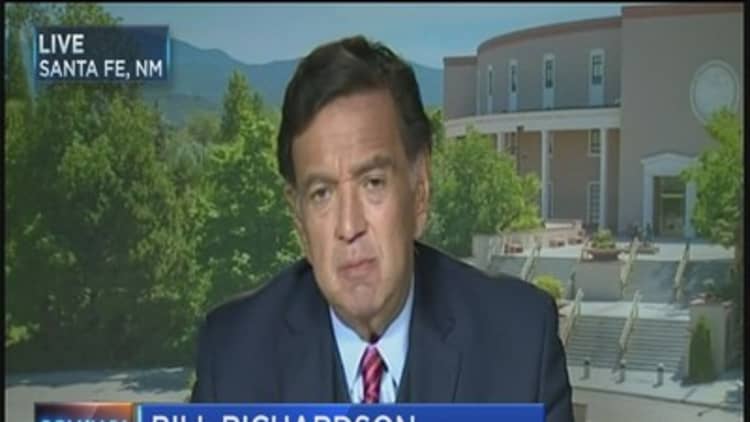




As markets enter their fourth trading week of 2016, the havoc wreaked by oil prices are still being felt across a whole range of assets and markets, with European stocks coming under renewed pressure Monday after Iraq announced its oil output had reached a record high in December.
"If you look over the past 12 months and you track an index of emerging markets, stocks, currencies, junk bonds, other commodities to oil; they're practically identical to the oil price," Alan Miller, SCMDirect.com's CIO, told CNBC Monday.
"The dramatic fall in oil has seen a sharp reduction in so many different markets and it hasn't balanced," Miller added.
One key factor influencing oil prices is Iran. International sanctions against the OPEC-member country were lifted in January, sending shock waves throughout global markets on concerns that the already-oversupplied oil environment would be burdened with even more oil.
How big of a return Iran will make in the oil markets is still unclear. Some analysts expect between 3 to 4 million barrels a day, while others expect technical constraints to hold back its near-term supply potential.
Following the lifting of sanctions last week, Iran reportedly issued an order to increase crude production by half a million barrels per day.
"I think (Iran's re-entry into oil) is going to be one of the really important variables in fundamentals this year. We're already seeing the first deal announced for a European buyer to start taking oil again from Iran, and we're seeing big numbers being talked about by the Iranian government," Richard Mallinson, geopolitical analyst at Energy Aspects, told CNBC Monday.
However, Mallinson admitted he believed Iran's re-entry into the oil market would be hampered by technical difficulties, as it will take time for Iran to get its volumes back up to normal levels.
"(Iran's return) shouldn't come as a huge surprise (to markets) that more oil is coming. The big question is how much comes and how fast, and that's where the market now needs to just watch," Mallinson said, adding that we'll have to watch the customs data from the big oil importers, as Iran doesn't publish weekly production statistics.
OPEC: Saudi Arabia vs Iran
Amid the chaos in the markets there have been growing calls, from countries including Venezuela, for OPEC to call an emergency meeting and address the supply problem.
Iran's oil minister, Bijan Zanganeh said Friday however that any emergency meeting of the Organization of Petroleum Exporting Countries (OPEC) could hurt the market, if no conclusion was made to support the falling oil prices.
Escalating tensions between Saudi Arabia and Iran, , isn't expected to aid the market either, as investors lose faith that the two countries could agree a possible cut at an OPEC meeting.
"The ability of a key OPEC member—and in that case in particular Saudi Arabia and Iran—to agree on a way forward in an OPEC meeting, in a context where geopolitical tension and heightened escalation of animosity between these two oil giants does not bode well for such an agreement (to cut oil production) any time soon," Alia Moubayed, economist for Middle East & North Africa at Barclays, told CNBC Monday.
On top of the pace and volume of Iran's oil production, this OPEC issue "argues for more downward pressure in the absence of any cut in the foreseeable future or an agreement towards that," said Moubayed, adding that while Barclays expects this pressure to continue in the first quarter, some market strain is expected to "dissipate" later in 2016, depending on how oil's supply and demand balance plays out.
OPEC's Secretary-General, Abdullah al-Badri said on Monday that to tackle the oversupply and prop up oil prices, it was essential for OPEC and non-OPEC members to work together to find a solution, Reuters reported.
While Iran's daily production has not yet been determined, Iran's production "is returning" says Neil Atkinson, IEA's head of oil industry and markets division, who told CNBC in January that "the market is going to have to find some way of absorbing those barrels".
"Not only have we got all this extra supply still continuing to come into the market in 2016, but we have less firmness on the demand side of the balance as well. So volatility looks as if it's going to be the order of the day."
Reuters contributed to this article.
—By CNBC's Alexandra Gibbs, follow her @AlexGibbsy and @CNBCi






